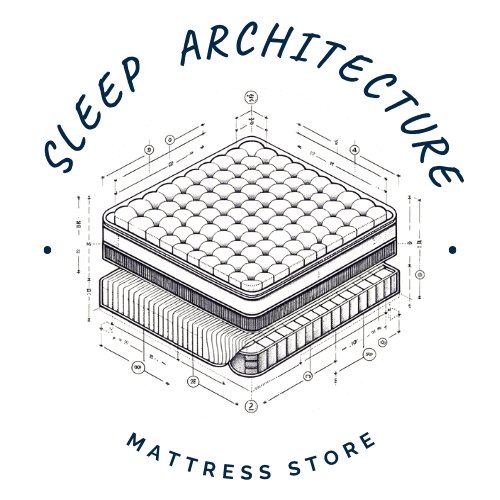
How to Combat Insomnia and Improve Sleep Quality

Insomnia can be a frustrating challenge, robbing you of the rest your body and mind need to function at their best. If you’re struggling to fall asleep, stay asleep, or simply aren’t feeling rested when you wake up, you’re not alone. Millions of people battle with sleep issues, but the good news is that there are steps you can take to improve your sleep quality.
At Sleep Architecture Mattress Store, we understand how important a good night's sleep is. That’s why we’re not only committed to providing you with the best mattresses and sleep essentials, but also want to share some expert tips to help you beat insomnia and enjoy restorative sleep.
1. Create a Sleep-Friendly Environment
Your bedroom should be a sanctuary for rest. It’s important to keep the space cool, quiet, and dark to encourage sleep. Read more here about creating the perfect sleep environment. Consider these environmental adjustments:
· Invest in Quality Bedding: A comfortable mattress is key to supporting a good night's rest. If your mattress is over 7-10 years old, or if you’re waking up with aches, it may be time for an upgrade.
· Control Lighting: Use blackout curtains or an eye mask to block out any disruptive light. Dimming the lights an hour before bed can also signal to your body that it’s time to wind down.
· Reduce Noise: If your environment is noisy, consider using a white noise machine or earplugs to drown out sounds that could wake you.
2. Stick to a Sleep Schedule
Your body’s internal clock, or circadian rhythm, thrives on consistency. Going to bed and waking up at the same time each day can help regulate your sleep cycle. Even on weekends, try to avoid major shifts in your schedule.
· Create a Bedtime Routine: Engage in relaxing activities like reading, light stretching, or taking a warm bath before bed. Over time, your body will associate these activities with sleep and will naturally begin to relax.
· Avoid Late Naps: While a short power nap can be helpful, long or late-day naps may interfere with your ability to fall asleep at night.
3. Be Mindful of What You Eat and Drink
What you consume throughout the day can have a significant impact on your sleep. Keep the following tips in mind:
· Limit Caffeine and Nicotine: Both are stimulants that can interfere with sleep, so it’s best to avoid them in the late afternoon and evening.
· Watch Out for Heavy Meals: Eating large meals or spicy foods right before bed can cause discomfort and indigestion, making it difficult to sleep. If you’re hungry close to bedtime, opt for a light snack like yogurt or a banana.
· Reduce Alcohol Consumption: While alcohol may make you feel drowsy initially, it can disrupt your sleep later in the night.
4. Manage Stress and Anxiety
Stress and anxiety are two of the most common causes of insomnia. To help your mind relax before bed, try the following techniques:
· Practice Relaxation Techniques: Deep breathing exercises, meditation, and progressive muscle relaxation can help reduce stress and signal to your body that it’s time to unwind.
· Journal Your Thoughts: If your mind races with worries or a never-ending to-do list, try writing down your thoughts before bed. Getting them on paper can help quiet your mind.
5. Use Your Mattress Wisely
Your mattress plays a critical role in your sleep quality. If you're experiencing discomfort, tossing and turning, or waking up with pain, it could be a sign that your mattress isn’t providing the support you need.
· Assess Your Mattress: A supportive and comfortable mattress can make all the difference. Look for signs of sagging or lumps, and consider your sleep style—side sleepers need a softer surface, while back sleepers might need something firmer. If you want to change the feel of your mattress, you can always add a topper.
· Try Memory Foam or Hybrid Mattresses: These mattresses often provide great pressure relief and support, which can help alleviate the discomfort that leads to insomnia.
6. Seek Professional Help if Necessary
If you’ve tried adjusting your habits and environment but still find yourself battling insomnia, it may be time to seek professional help. Chronic insomnia can be a symptom of underlying health issues like sleep apnea, depression, or chronic pain, so talking to a doctor or sleep specialist is essential.
Conclusion
Improving your sleep quality and overcoming insomnia often requires a combination of lifestyle changes, a sleep-friendly environment, and the right mattress. At Sleep Architecture Mattress Store, we’re here to help you find the perfect mattress to support your journey to better sleep. Whether you need memory foam, hybrid, or another type of mattress, our expert staff can help you make the best choice for your needs.
Investing in your sleep is an investment in your health. Visit us today and start your path toward restful, restorative nights!
(Image Courtesy Repose Therapy)
Send a Message
At Sleep Architecture, we value your feedback and insights. Whether you have questions about our products, want to share your experience, or are ready to book a consultation, we're here to help. Leave a comment, ask a question, or book an appointment today. Your input helps us continue to provide the best possible service to our valued customers. Let's start the conversation!
Contact Us
Give us a call
(330) 954-8007Send us an email
[email protected]